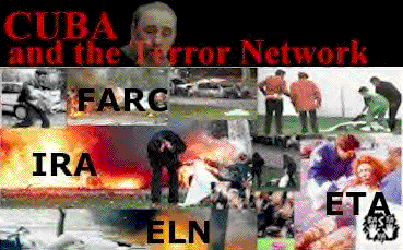Worldwide Terrorism & Crime Against Humanity Index
"I am a man,and whatever concerns humanity is of interest to me,"
- Terence
- Important Links -
Send Us Your most important Links - PriceGraphics@Aol.Com
Fighting Terrorism: A World Aflame
"The future is not the son of Desert Storm, but the stepchild of Somalia and Chechnya."
General Charles Krulak - 31st Commandant - United States Marine Corps
Concepts for the Future; Learning from the Past
Understanding Low-Intensity Conflict
The Middle East Forum, a think tank, works to define and promote American interests in the Middle East. Founded in 1990, the Forum became an independent organization in 1994.
The MEF Mission
The Forum holds that the United States has vital interests in the region; in particular, it believes in strong ties with Israel, Turkey, and other democracies as they emerge; works for human rights throughout the region; seeks a stable supply and a low price of oil; and promotes the peaceful settlement of regional and international disputes.
MEF sees the region, with its profusion of dictatorships, radical ideologies, existential conflicts, border disagreements, political violence, and weapons of mass destruction as a major source of problems for the United States. Accordingly, we urge active measures to protect Americans and their foreign allies from these dangers.
Toward this end, the Forum seeks to help shape the intellectual climate in which U.S. foreign policy is made by addressing key issues in an accessible way for a sophisticated public.
Middle East Quarterly. Published since March 1994, the Quarterly is a policy-oriented journal aimed to provide cutting-edge information for specialists and absorbing information for a general readership. It is the only journal on the Middle East consistent with mainstream American opinion.
|
The Simon Wiesenthal Center
The Center for Justice and Accountability
George Duncan's Site Concerning War Crimes of World War II
CATO Institute
The Cato Institute was founded in 1977 by Edward H. Crane. It is a non-profit public policy research foundation headquartered in Washington, D.C. The Institute is named for Cato's Letters, a series of libertarian pamphlets that helped lay the philosophical foundation for the American Revolution.
Cato's Mission
The Cato Institute seeks to broaden the parameters of public policy debate to allow consideration of the traditional American principles of limited government, individual liberty, free markets and peace.
Toward that goal, the Institute strives to achieve greater involvement of the intelligent, concerned lay public in questions of policy and the proper role of government.
|
Why Spy?
The Uses and Misuses of Intelligence
by Stanley Kober
CATO Policy Anaylsis 265
December 12, 1996
|
CATO: Executive Summary
"America's intelligence agencies should devote their resources to the most serious security threats, principally international terrorism and adverse political trends. Instead, the Clinton administration has diverted the intelligence community to economic espionage.
The economic espionage mission is based on faulty assumptions and damages relations with governments whose cooperation we may need in dealing with significant security threats. Indeed, Washington's use of the Central Intelligence Agency for economic spying has already led to ugly incidents with Japan and France. The focus on commercial espionage also creates a myopic perspective from which developments such as massive corruption in another country are seen as merely economic factors, rather than harbingers of political instability.
There are more than enough bona fide security problems in the world to command the full attention of the intelligence community. The most serious is international terrorism. Penetrating and neutralizing shadowy and secretive terrorist organizations will pose a daunting task for the intelligence agencies. There are also disturbing political trends that warrant close scrutiny, including the continuing turbulence in Russia; China's emergence as an assertive, if not abrasive, great power; and early signs of a Beijing-Moscow axis motivated by hostility toward the United States.
It is essential, not only that the intelligence agencies focus their efforts on such actual or potential security problems, but that policymakers listen to the agencies' assessments, especially when those assessments raise questions about the wisdom of current U.S. policy. Unfortunately, the Clinton administration all too often seems indifferent if not hostile to such valuable early warnings."
Stanley Kober is a research fellow in foreign policy studies at the Cato Institute.
http://www.catoinstitute.com/pubs/pas/pa-265.html
|
The Terrorism Research Center - Profiles in Terror
US State Department Information on Iraq; a Terrorist State

